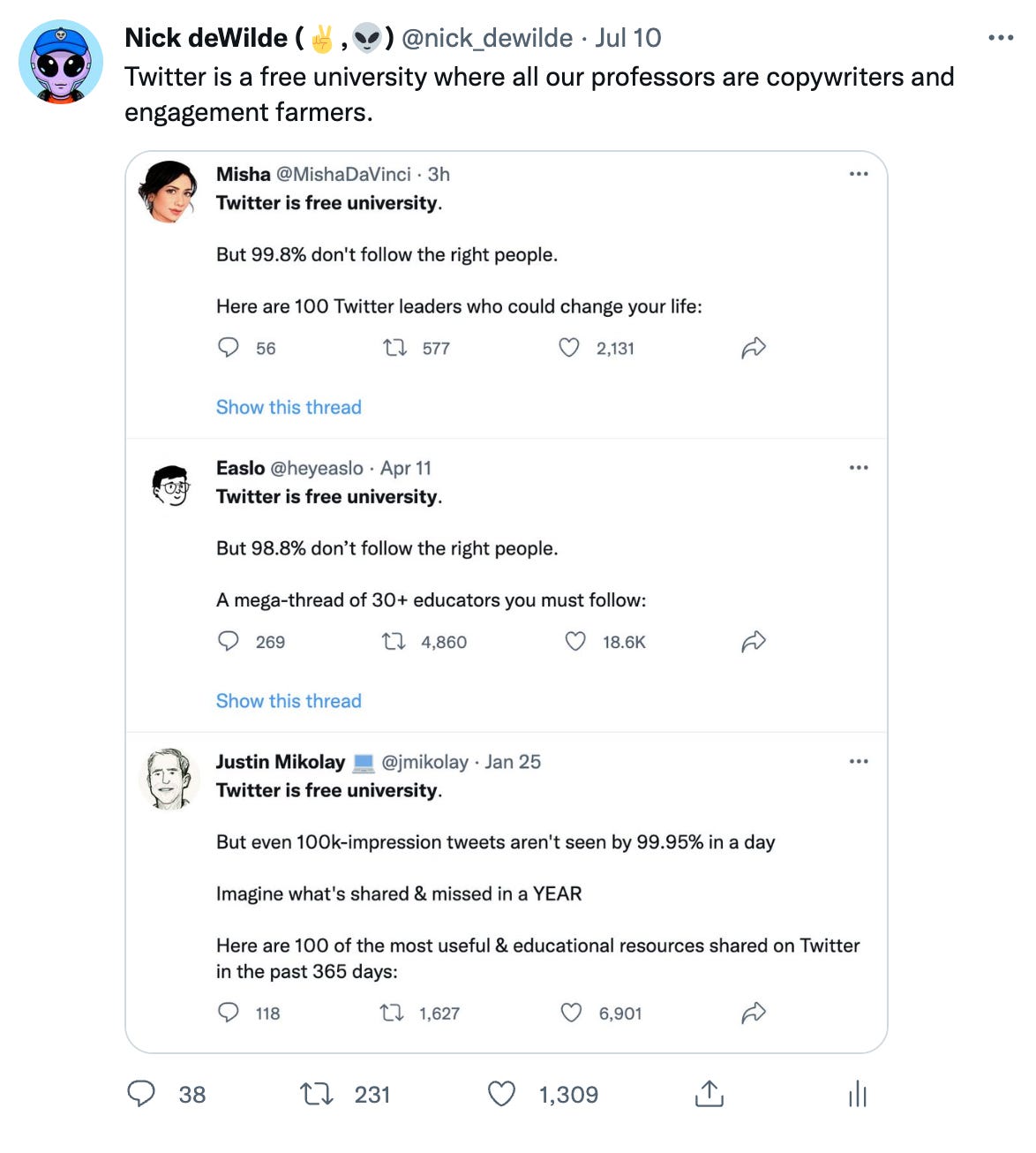Against Engagement Farming
At the free university of Twitter, we’re getting the education we paid for
👋 Welcome to the latest issue of The Jungle Gym – the newsletter that helps you build a more fulfilling career by integrating your work and life.
✨ If you’re a new reader, thanks for stopping by. Feel free to check out this introductory post, which explains what The Jungle Gym is all about.
📬 To get future issues delivered to your inbox, enter your email here:
I’m not usually a snarky person. But last weekend, I couldn’t help myself.
Based on the reactions to my tweet, it seems like I’m not the only person who’s sick of the engagement farming tactics that have overtaken Twitter.
It was one thing when media companies, like Buzzfeed and Upworthy—were churning out clickbaity blog posts, but there’s something dystopian about watching people copy this playbook to harvest attention from their followers.
I’m not against building an audience on social media. I understand the value of a bigger megaphone, a larger network, and opportunities to make money independently. But, that doesn’t mean people should use any trick in service of winning these prizes.
For example, take this increasingly common tactic where people intentionally make their opinions more provocative to gin up controversy and drive distribution for their tweets.
While I’m sure Ryan believes some version of what he’s saying, it’s clear he intentionally stripped the nuance from his message to insight conflict. After all, it worked when he posted the same thing back in 2019 (now deleted).

Let me break down how this game works:
Some Twitter personality comes up with a controversial opinion on a topic that applies to a lot of people.
While said Twitter personality is smart enough to recognize the debate isn’t black and white, he knows Twitter’s algorithm will reward him for causing conflict. So, he strips the idea of context and uses all his favorite engagement farming hacks to make the message as triggering as possible.
When readers encounter the tweet, they feel compelled to argue via comments and quote tweets.
The ranking algorithm ensures that the most emotionally-charged reactions get surfaced to readers who can’t help but pay attention. Each click reinforces Twitter’s decision to keep promoting the tweet until the entire internet is embroiled in the manufactured controversy.
All the while, the guy who wrote the original tweet is racking up followers and being rewarded for inciting a flame war.
Who knows, maybe Ryan actually believes that everyone who chooses to sleep 8 hours or raise kids on the weekend is doomed to an unsuccessful career.
And maybe Noah truly has “0 sense” of why someone might want a steady job at a successful company like Google.
Perhaps Jovan can’t conceive of any Earthly situation in which doing free work can be advantageous for a freelancer’s long-term career.
But somehow, I doubt it. In reality, I believe these people know exactly what they are doing. Just watch repeat offender, Nick Huber explain how creating controversy online supports his audience-building strategy (starts 12:27).
None of these people are bad actors. Each of them has plenty of valuable things to say, which is how they earned their large audiences in the first place. But like many successful audience builders, they are succumbing to the incentives of Twitter’s algorithm and creating externalities in the process.
As ill-advised as it may be, readers take cues from the people they follow to make important choices about how to live. When a high-status person with +200k followers signals that it’s stupid to prioritize life on the weekends, work at big companies, or do free work, people adjust their choices accordingly. Unfortunately, they rarely moderate these hyperbolic opinions with the kind of high-context advice that’s crucial for making these kinds of nuanced decisions.
Ultimately, the games we play shape who we become. Competing for money can make us more industrious or greedy. Vying for love can make us more conscientious or manipulative. The status game is no different.
To win a big audience, we increasingly must play by the rules of social media platforms like Twitter. Before confirming our conduct to Twitter’s algorithm, it’s worth considering whether the platform’s incentives actually align with our own.
I’m not against posting threads, sharing controversial opinions, or even using copywriting tactics. I just want people to say things that accurately represent their beliefs instead of stuff that will help their tweets get better distribution.
In our journey to become educators, I just don’t want us to accidentally turn into a bunch of engagement farmers.
Related Posts
For Your Information Diet
📉 How a Recession Could Weaken the Work-From-Home Revolution – The Great Resignation gave workers unprecedented influence over their jobs. But as we enter into a recession, workers may start feeling the pressure to return to the office to avoid being replaced. (The Atlantic)
🛠 Technically – Working in the tech industry can be tough without some base of technical knowledge. But, even if you’re motivated to learn, it’s hard to know where to start and how deep to go. Technically is a blog for non-engineers who want to dive in and start learning. (Technically)
🤡 The Locus of Entertainment – "The problem isn’t the screens, it’s what's behind them. What screens have enabled is a gradual shifting of our locus of entertainment from internal to external. From entertainment being something we generate to something generated for us. And as a consequence, we’re losing the ability to entertain ourselves, relying on increasingly stimulating sources as our entertainment muscles continue to atrophy." (Infinite Play)
🤒 Does Glorifying Sickness Deter Healing? – As our culture attempts to celebrate and de-stigmatize sources of victimhood, people are increasingly arguing that mental illness shouldn’t be classified as sickness. Writer Freddie deBoer, who has been institutionalized with bipolar disorder, shares why “gentrifying disability” is a dangerous direction for our society and the people who are suffering from serious mental illness. (Honestly)
🌎 What a Time to Be Alive – With all the economic turmoil surrounding us, it’s easy to forget what a great time period we live in. From child mortality rates to literacy, we live in a moment of unprecedented bounty. While we should constantly be striving to improve the lives of our fellow humans, it’s worth remembering every now and then how lucky we truly are. (Young Money)
Thanks for reading today’s issue of the Jungle Gym. If you enjoyed what you read, I’d really appreciate it if you could forward it to a friend, family member, or colleague who you think might like it too.
Or, if you'd like to share it on one of your social networks, that’s always great as well.
Until next time,









Awesome post Nick!